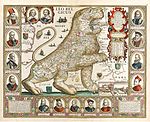| History of Belgium |
|---|
 |
|
Timeline • Military • Jewish history • LGBT |
In the history of Belgium, the period from 1789 to 1914, dubbed the "long 19th century" by the historian Eric Hobsbawm, includes the end of Austrian rule and periods of French and Dutch rule over the region, leading to the creation of the first independent Belgian state in 1830.
In the years leading up to 1789, the territory today known as Belgium was divided into two states, called the Austrian Netherlands and Prince-Bishopric of Liège, both of which were part of the Holy Roman Empire. The area was captured by the French during the French Revolutionary Wars and incorporated into the French First Republic from roughly 1794 to 1815. In the aftermath of Napoleon's final defeat in 1815, the Congress of Vienna added the territory of Belgium to the United Kingdom of the Netherlands.
In 1830, with the Belgian Revolution, the Belgian provinces declared their independence, but only finally gained it in 1839. From 1885 the creation of a personal colony by King Leopold II, the Congo Free State caused an international outcry over human rights abuses, and forced the Belgian state to annex the region in 1908, forming the Belgian Congo. In 1909, after his uncle's death, Albert I began his reign, which lasted until 1934. Despite having declared neutrality, Belgium was invaded by the German Empire in August 1914, beginning the country's involvement in World War I.
The "long 19th century" saw profound cultural and economic changes in Belgium. The Industrial Revolution, which began to take effect in Belgium during the period of French rule, transformed the country's economy over the course of the period. By 1914, Belgium was acknowledged as one of the most densely industrialized countries in Europe, with notable coal mining and manufacturing industries.
At the start of the period, French was the dominant language, and was the only one approved for use in legal and government business, however Belgium became officially bilingual in 1870 and Dutch was officially recognized as an equal language to French in legal matters in 1898.
